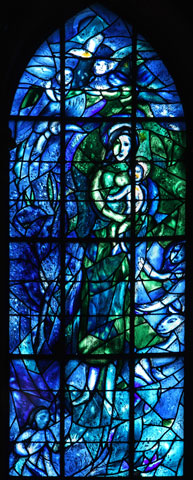
A stained glass window created by Jewish artist Marc Chagall with glassworker Charles Marq in 1974 depicts the Virgin and Child in Notre-Dame de Reims Cathedral in France. (Newscom/Manuel Cohen Photography/Manuel Cohen)
 IN QUEST OF THE JEWISH MARY: THE MOTHER OF JESUS IN HISTORY, THEOLOGY, AND SPIRITUALITY
IN QUEST OF THE JEWISH MARY: THE MOTHER OF JESUS IN HISTORY, THEOLOGY, AND SPIRITUALITY
By Mary Christine Athans
Published by Orbis Books, $19
How did Mary experience her religious life as a Jewish woman who came to be proclaimed the mother of God, Theotokos? This is the provocative question raised by Sr. Mary Christine Athans in her fascinating book, In Quest of the Jewish Mary.
At times, Mary is simply not a concern for some Christians. According to the 19th-century German Protestant theologian Gustav Volkmar, "Christianity was born of the virgin womb of the God of Judaism." By suggesting that God was a virgin until birthing Christianity, Volkmar wrote Mary out of the genealogy and simultaneously implied that Judaism was not born of God; Christianity was God's first and only offspring.
The combination of Volkmar's two negations -- eradicating Mary and denying Judaism's birth from God -- is precisely what Athans, a Sister of Charity of the Blessed Virgin Mary, wants to overcome. By examining the history of church doctrine concerning Mary and the history of modern scholarship on the Jewishness of Jesus, she calls our attention to the religious Jewish environment in which Mary lived and flourished. Her book invigorates Mary's centrality in the historical life of Jesus and his earliest followers, and opens a wonderful new setting for Jewish-Christian dialogue. As David Flusser, the New Testament scholar from Hebrew University, wrote, "Mary is a certain link between Jesus and the Jewish people."
Jewish theologians often speak of Judaism and Christianity as mother and daughter. One puzzle that Athans doesn't address is why the genealogy of Jesus in the Gospel of Matthew traces his roots through his father, Joseph, rather than his mother. More puzzling is the Gospel's lineage of Joseph, which is not traced to the traditional matriarchs of Hebrew Scripture (Sarah, Rebecca, Rachel and Leah), but to biblical women, such as Tamar and Rahab, who have experienced unpleasant relations with men. Their contrast with Mary is striking and perhaps serves to frame her uniqueness as a woman.
The question for the early church was whether Mary should be proclaimed Theotokos, Mother of God, or simply Christokos, the mother of the humanity of Jesus. That question was debated at the fifth-century Council of Ephesus, Athans reminds us. The conclusion of the church fathers, that Mary was Theotokos, resulted in the emphasis on her virginity and holiness to the neglect of her humanity and Jewishness. The otherness of Mary as Virgin Mother placed her out of reach of human identification, but Marian devotion, revived in the Middle Ages, was not only deeply important to Catholics, it also influenced medieval Jewish mystical understandings of God's immanent presence, the Shekhinah, as feminine, as the scholar Arthur Green has masterfully demonstrated.
Elevated by Catholics to a status transcending the quotidian life of mortal women, Mary could have been re-humanized by Protestant theologians. Instead she was cast aside as unimportant, and once Pope Pius IX proclaimed the doctrine of Mary's Immaculate Conception 1854, the views of these two Christian churches moved increasingly apart from each other.
The Second Vatican Council (1962-65), reconsidering the humanity of Jesus, also reconsidered Mary. Its deliberations were influenced by a growing number of distinguished Catholic theologians, such as Dominican Fr. Edward Schillebeeckx, who called attention to the Jewish Mary. Feminist theologians such as Rosemary Radford Ruether wrote, "Only through [Mary's] free human responsiveness to God is God enabled to become the transformer of history. ... Mary's faith makes possible God's entrance into history." Ruether's remarkable statement liberates Mary from a passive vessel into a crucial figure in God's drama of salvation history.
In her learned chapter on the history of modern scholarship on the historical Jesus -- a project undertaken primarily by German Protestants, but also by Jewish scholars such as Abraham Geiger -- Athans notes the widespread consensus today that Jesus was a Pharisee. She then asks: What was the religious life of women in the Pharisaic community? After all, if Jesus was a Pharisee, would not Mary have also been part of that religious fellowship?
Here is where Athans becomes remarkably creative. She portrays Mary as a woman who knew and blessed God, a faithful, observant Jewish woman who observed the Sabbath, heard the Torah read aloud in the synagogue, immersed monthly in the mikvah (ritual bath) and prayed in words drawn from Moses, Jeremiah, Hannah, Esther and the Psalms.
Athans concludes her book with a meditation, based on the Ignatian contemplative tradition, in which she reflects on Mary's inner life. This deeply moving conclusion imagines, with enormous sensitivity, the spiritual life of Mary as she faced the joy of birthing Jesus, the celebrations with him at Cana, the horror of his death, and gratitude for his life. How would Mary have expressed her faith? Athans draws from the Hebrew Bible and from Jewish liturgy to give voice to Mary's own experience. Biblically rich and deeply moving, this is a book of rare originality and creativity that will inspire faith and invigorate religious dialogue.
[Susannah Heschel is professor of Jewish studies at Dartmouth College and the author of Abraham Geiger and the Jewish Jesus and The Aryan Jesus: Christian Theologians and the Bible in Nazi Germany, and editor of Abraham Joshua Heschel: Essential Writings.]


